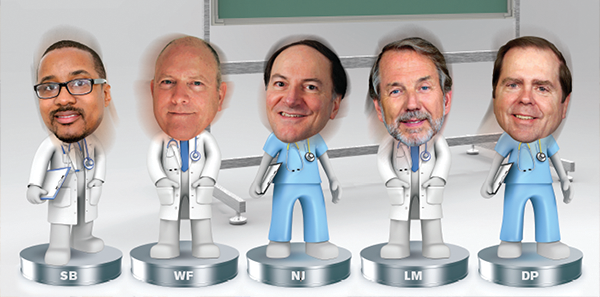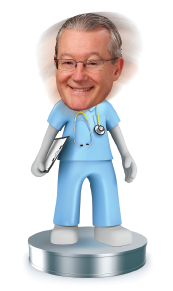
For decades, the concepts of democracy and democratic group practice have been held as the standard to strive for in emergency medicine, but with the evolving landscape of health care, is it time to revisit these concepts? What role will democratic groups have in the future of emergency medicine? In Part 3 of this three-part series, EM leaders from different walks of life weigh in on the following questions. Be sure to read Part 1 and Part 2.
Explore This Issue
ACEP Now: Vol 35 – No 01 – January 2016—Kevin M. Klauer, DO, EJD, FACEP
Moderator

Ricardo Martinez, MD, FACEP, chief medical officer for North Highland Worldwide Consulting and assistant professor of emergency medicine at Emory University in Atlanta.
Participants
Savoy Brummer, MD, FACEP, vice president of practice development at CEP America in Belleville, Illinois, and chair of the ACEP Democratic Group Section
Wesley Fields, MD, FACEP, past chair and the most senior member of the Board of Directors of CEP America in Emeryville, California
Nicholas J. Jouriles, MD, FACEP, president of General Emergency Medical Specialist Incorporated, a single-hospital group in Akron, Ohio
Lynn Massingale, MD, FACEP, executive chairman of TeamHealth in Knoxville, Tennessee
Dighton C. Packard, MD, FACEP, chief medical officer of EmCare in Dallas
RM: Is the democratic model that we have articulated in the past going to be the most successful structure in the future, or do we all have to begin to give up a little something to get something bigger?
DP: The silence probably speaks for itself. I’m not sure that it’s a matter of democratic versus nondemocratic. Regardless of whether you’re democratic or nondemocratic, I think a larger group actually gives you the opportunity to take some risk, to try different models. I don’t know if they’re all going to win or all going to lose, but if you’re large enough, you can take a risk and you can try different things and then, hopefully, spread that success across your system. If the democratic group has the willingness to invest in itself, to take those risks, then I think they can be as successful as a nondemocratic group.
SB: I would tend to agree. Having scale and having a sound financial base does allow you the flexibility to invest and experiment and even make mistakes. I think that, again, having those types of resources allows you to evolve, and democratic groups cannot be afraid to experiment to make investments in themselves and to change to meet those expectations of our hospital partners. It is more challenging when you have to service a certain amount of debt, or you have to make your shareholders at a smaller individual site happy.
LM: There are such pressures to move toward models that lower costs and, perhaps for the first time ever, really pay us for quality and outcomes. I do believe, regardless of size or structure, any of us can succeed if we’re meeting the needs of our hospital clients/hospital customers. If the hospital is well-served, they will never call Dighton or us. On the other hand, if we serve their needs well, then I think they will call us. Ultimately, if you’re meeting the needs of the hospital, your contract is probably not going to go out for bid.
NJ: I agree with Lynn and might take it a step further. The groups that are taking care of the patients are also helping the hospital system. That’s what’s been good about our group; we’ve been able to take care of the patients and keep the hospital happy. As long as you take care of your hospital and your patients, the group, no matter what size, is going to survive no matter what the structure.
RM: What would be the one or two things people should start thinking about now in order to ensure success?
WF: I think the thing that won’t work is the concept that you train, you get board certified, and that you can spend the rest of your career practicing at Fort Apache. I think the folks that are going to be adding value, improving patient care, and improving population health are going to see themselves as being part of teams providing systems of care and improving processes of care, and are more likely to succeed.
NJ: What Wes said was brilliant. We’ve seen a change in how we define medical excellence. Back in the day, it used to be, “Did you order one of everything?” Now, it is not only, “Is your clinical care focus on the evidence and research to support your care?” but, “Is it also as efficient as possible?”
SB: Specifically for democratic practices, I think in the next five to 10 years we’re going to see increased integration across the acute-care continuum. I think that you will likely also see an increase in the scale of democratic practice compared to what has traditionally been known. I think that all practices are going to have to demonstrate value for their patients, and this will require a certain amount of innovation.
DP: I think the next two to three years are going to be tumultuous. Five years from now, I think emergency medicine will be known for three things. First, the traditional: if you’re really sick or hurt, it’s the only place to go. Second, we will be noted to be the best urgent care diagnosticians in the world. Third, I think we will be experts on transitions of care, particularly in those transitions not only into the hospital to decrease length of stay but also transitions into the community. I think it’s a great future.
LM: I think the emergency department will see much higher acuity. I do think there will be a lot of success with moving patients out to urgent care and providing care by telemedicine. If you look at the percentage of patients on the exchange that are picking high-deductible health plans and knowing that many of those patients are going to have a really hard time paying those bills, we think more and more people are going to go toward places that they perceive as best value. Additionally, emergency medicine will have greater and greater responsibility for cost. The last thing is integration, both in hospital medicine and with post-acute care.
RM: I really want to thank you for sharing your insights, experience, and perspectives for our readers. Thank you very much.
Pages: 1 2 3 | Multi-Page




No Responses to “Emergency Medicine Leaders Discuss Role of Democratic Groups in Future of EM”